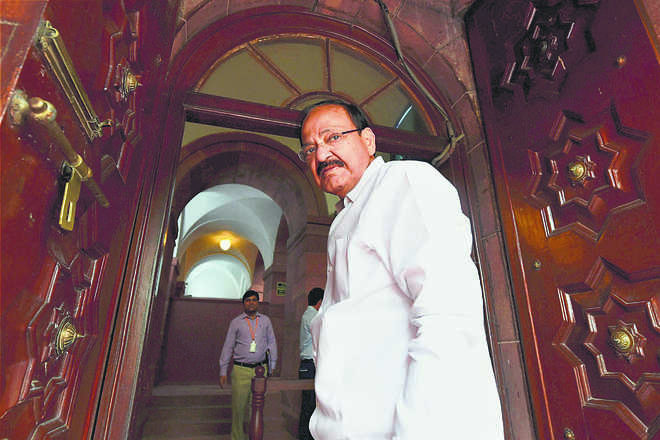
The mantle: Venkaiah Naidu as the ex-officio Chairman of the Rajya Sabha will have to balance contrarian views.
KV Prasad
ON Friday when M Venkaiah Naidu takes oath of office of the Vice President of India, he also assumes another role envisaged by the Constitution — the ex-officio Chairman of the Rajya Sabha.
Unlike most of his predecessors, Naidu will have the opportunity to receive felicitations from the august House on the day he takes charge.
Barring Sarvepalli Radhakrishnan, the first Vice President who occupied the second-highest Constitutional office for two terms, on most occasions in the past either the House was not in session or there was a interim break. An hour after being administered the oath by the President, Naidu will have the opportunity to Chair the last day of the current Monsoon session in his new role.
Naidu comes to the office with the unique distinction of having been a member of the Council of States for a prolonged period. This position brings to him and the House an unparalleled advantage at a time when the debate over the role, responsibilities and relevance of the Rajya Sabha remains alive. Over two years ago, the Leader of the House and Finance Minister Arun Jaitley defended the move of the Narendra Modi government to tag a clutch of proposed legislation under an omnibus Money Bill, invoking Article 110 of the Constitution. It was towards the end of the Budget session Jaitley defended it posing a question in parliamentary democracy wherein the wisdom of the directly elected house is repeatedly questioned by the House that is elected indirectly.
Union Minister Jaitley is eminently qualified to hold a strong opinion on the issue. During his long and distinguished career as a parliamentarian, he was and is an illustrious member of the House holding eminent positions, including as the Leader of the Opposition. His role was recognised by fellow members to bestow the honour of “Best Parliamentarian” on him a few years ago. Ironically, another prominent member of the Bharatiya Janata Party, its president Amit Shah articulated a similar view that in a democratic republic, the Lok Sabha should have supremacy.
The argument advanced is that the party that holds the majority in the House of the People should have its way on legislation cleared by the directly elected chamber. Incidentally, Shah makes a debut as the newest member of the House having been elected for the first time on Tuesday.
The role and relevance of the Council of States has figured periodically since the Constituent Assembly deliberated and took a final view after Gopalaswamy Ayyangar in a reply to the debate observed: “The need for a second chamber has been felt practically all over the world wherever there are federations of any importance. After all, the question for us to consider is whether it performs any useful function. The most that we expect the second chamber to do is perhaps to hold dignified debates on important issues and delay legislation which might be the outcome of passions of the moment until the passions have subsided and calm consideration could be bestowed on the measures which will become the Legislature; and we shall take care to provide in the Constitution that whenever on any important matter, particularly matters relating to finance, there is conflict between the House of the People and the Council of States, it is the view of the House of the People that should prevail.”
That the strength of the BJP and its alliance partners was inadequate added to woes of the ruling coalition's attempt to aggressively push through major changes in existing laws or legislate new ones — be it the land acquisition or the Goods and Services Tax.
A determined Opposition checkmated attempts by the ruling coalition to have its way on several Bills passed by the Lok Sabha by forcing a referral to a Select Committee for greater parliamentary oversight. This is a prescribed practice that saw a surge in recent times. The tactic the Opposition employed could also been viewed in the context of the reluctance of the government in following another practice of referring Bills to the Parliamentary Committees of jurisdiction for scrutiny.
Arun Jaitley's as the Leader of the Opposition in the Rajya Sabha had once said that the “Government can have its way provided the Opposition has had its say”. The outgoing Chairman Hamid Ansari's experiment to insulate 60 minutes of the Question Hour from disruptions, when members hold the government accountable for its work, was largely successful. In the interest of informed law making, another fine tradition was evolved through an unwritten pact —not to push through legislation when the House is not in order. Ironically, when parties swapped sides in the House, concession sought on this count was politely declined by gently reminding of the solemn promises made by parties on either side of the aisle. The change of sides should not result in change of positions.
The Rajya Sabha predominantly remains a deliberative body that discharges it legislative function at its own pace. The governments of the day could experience the less-than-hurried rhythm of its working as slowing down of a process. The larger objective remains unhindered just as in the US, lawmaking in the Senate is likened to pouring a cup of hot coffee in the Senatorial saucer to allow it cool down.
The challenge before the new Chairman remains to address the concerns of members across the aisles. He has to do this while safeguarding the role of the chamber as envisaged by the founding fathers; provide adequate space to those who hold contrarian views and dissuade the government from bringing legislation, that in the opinion of experienced lawmakers requires greater parliamentary scrutiny, before the House by clubbing varied subjects through an omnibus bill as an easy way out.



























